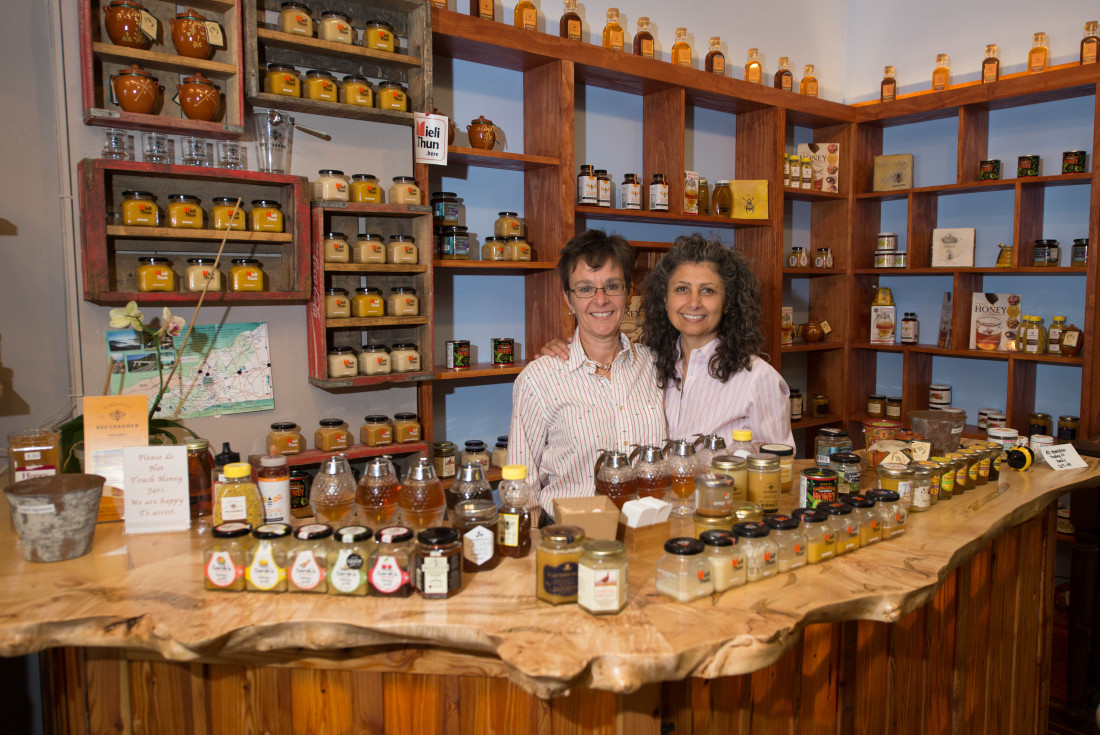Within the space of about a year, Jill Kelly and Kim Allen sent their son off to college, gave up their jobs as commodities traders in Chicago, moved to Asheville and immediately opened a retail business with two storefronts — one in West Asheville and, shortly thereafter, one downtown.
With their business, Asheville Bee Charmer, and in their personal lives, the focus of much of their considerable energy is the welfare of the honeybee. Since they launched Asheville Bee Charmer in 2014, the couple — who are also beekeepers — have been devoted to supporting local efforts to raise awareness about colony collapse disorder and other issues affecting the pollinators of the world, Kelly says.
Their upcoming Pollination Celebration event — a honey-tasting contest and party on Monday, June 15, at their downtown store — will be aimed at educating the public about honey and pollinators, as well as serving as a fundraiser for local pollinator awareness organization Bee City USA.
“That’s where our heart is at: anything we can do to help Bee City, anything we can do to help the Center for Honeybee Research,” Kelly says. “When people come into the store and taste honey, we always, always try to slip in those names and hope that people will go to the websites, that people will read and maybe give a little.”
Just walking into one of the Asheville Bee Charmer shops is a lesson on all things apian. Employees known as “bee-ristas” stand behind the honey bar offering samples of several kinds of honeys from around the world. Along with taste tests, the bee-rista provides information about each honey’s provenance and answers questions. Maps hang on the wall to show where certain types of flowering plants and trees grow, such as sourwood.
Kelly and Allen send each new honey that comes into their shop for testing in the labs at Texas A&M University — at a cost of $75 per sample — to determine precisely what its plant origins are. The resulting 10-page report gives precise percentages of exactly what’s in the honey, and that information is placed on the back of each jar at the honey bar for reference.
“Then people can start to understand,” says Kelly. “When you say a person has sourwood and tulip poplar and clover on his land, they can taste that. And they can compare it to someone who has tulip poplar, locust, wildflowers, clover, blackberries and blueberries on their land, so now there’s a similarity, but maybe they can also taste that addition of fruit.”
She adds that they keep flavor wheels from the University of California, Davis on the walls near the honey bar to give guests an idea of what specific nuances to look for as they taste. “If you put the words in front of them, it’s almost like wine tasting. So you can say, ‘Yes, that’s very earthy,’ or ‘Yes, I can taste the fruit,’ or ‘Wow, this one goes right up my nose.’ So it gives them a better vocabulary.”
Kelly says the June 15 Around the World Honey Tasting Adventure at Asheville Bee Charmer will feature a tasting contest with 10 different honeys as well as a variety of honey and bee trivia contests. T-shirts, honey and seed bombs provided by Asheville GreenWorks will be offered as prizes, and there will be finger-food snacks available — some doused in honey, of course.




Before you comment
The comments section is here to provide a platform for civil dialogue on the issues we face together as a local community. Xpress is committed to offering this platform for all voices, but when the tone of the discussion gets nasty or strays off topic, we believe many people choose not to participate. Xpress editors are determined to moderate comments to ensure a constructive interchange is maintained. All comments judged not to be in keeping with the spirit of civil discourse will be removed and repeat violators will be banned. See here for our terms of service. Thank you for being part of this effort to promote respectful discussion.